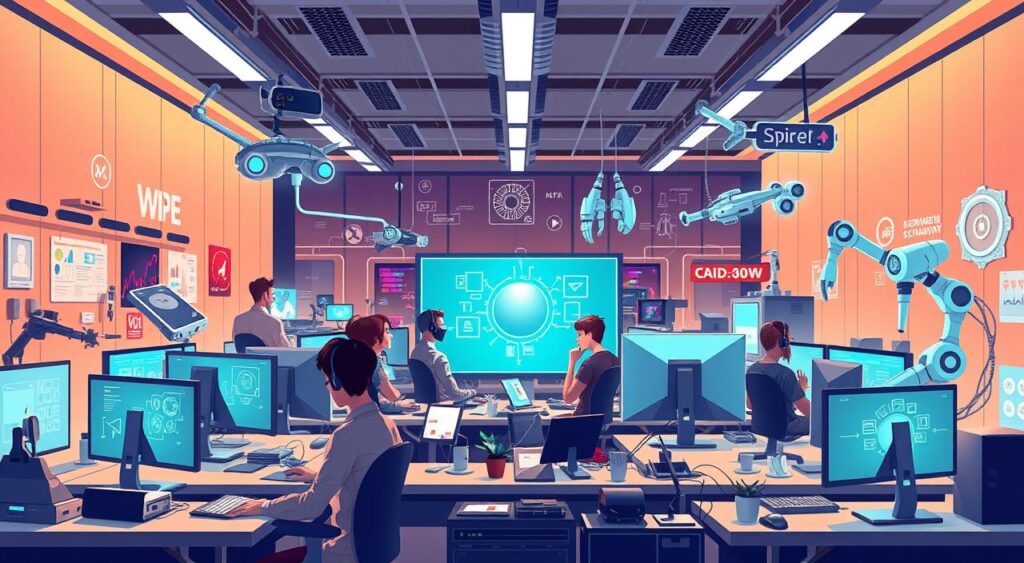The Future of Work: Top 5 Careers That Will Dominate in 2025
As you ponder your career path and the evolving job market, you might wonder about the future of work. With rapid technological progress, it’s vital to anticipate the top careers set to lead in 2025. Careers like artificial intelligence specialists, cybersecurity experts, and data scientists are poised to thrive. These roles are at the forefront of a rapidly changing work landscape.

As you explore the future job market, understanding the required skills for these sought-after positions is key. The rise of technology and automation is reshaping the job market, creating new roles that demand unique skills in ethics and bias management. The question is, are you ready to adapt and seize the opportunities that future careers and career development will bring?
Introduction to Future Careers
The job market is in a state of constant evolution, making it critical to stay abreast of the latest trends and developments in career development. By grasping the top careers expected to lead in 2025, you can make strategic decisions about your education, training, and career path. This will pave the way for a successful future in the job market.
Key Takeaways
- The top careers that will dominate in 2025 include artificial intelligence specialists, cybersecurity experts, and data scientists.
- These careers require unique skills in ethics and bias management, as well as expertise in technology and automation.
- The job market is expected to create new roles that require specialized skills, such as human-machine teaming managers and algorithm bias auditors.
- Salaries for these in-demand careers range from $80,000 to over $300,000 annually, depending on the role and industry.
- It’s essential to stay ahead of the curve and continuously update your skills to remain competitive in the future job market and achieve success in your career development.
- Understanding job market trends is critical for making informed decisions about your education, training, and career path.
The Rise of AI and Automation in Careers
When pondering your professional aspirations, grasping the role of AI and automation in employment opportunities is critical. The job landscape is transforming, with some roles more impacted than others. Between 2019 and 2022, the US saw 8.6 million job shifts, a 50% increase from the previous three years.
To remain competitive in an AI-driven world, acquiring skills like programming, data analysis, and critical thinking is vital. These abilities are key for career advancement across various sectors. In-demand skills include:
- Programming
- Data analysis
- Machine learning
- Natural language processing
By recognizing AI’s influence on employment opportunities and honing the right skills, you can prepare for the future job market. Success hinges on embracing change and being flexible in an evolving job scene.
Healthcare Careers: A Growing Demand
The healthcare industry is booming, with a high need for skilled workers. This trend is set to continue, with a 13% jump in healthcare jobs by 2031. This growth outpaces the national average, making healthcare careers highly sought after.
To thrive in healthcare, one must possess key workplace skills. These include effective communication, teamwork, and problem-solving. With technology’s rise in healthcare, digital proficiency is also vital. This includes skills in electronic health records and telemedicine. Here are some in-demand healthcare professions:
- Registered Nurses: $77,600 median annual salary, 6% anticipated job growth
- Nurse Practitioners: $120,680 median annual salary, 46% anticipated job growth
- Physical Therapists: $95,620 median annual salary, 17% projected job growth
Continuing education is essential for healthcare professionals to keep up with new technologies and methods. This investment not only boosts their job prospects but also supports the industry growth of the healthcare sector.

Green Jobs: Careers in Sustainability
Exploring career options, you might find interest in the expanding green jobs sector. This area is witnessing substantial growth, with a focus on renewable energy and sustainability. These fields are becoming increasingly important.
The green economy is experiencing rapid expansion, with a projected 11% growth rate from 2019 to 2029, as reported by the U.S. Bureau of Labor Statistics. This surge is fueled by the escalating need for sustainable solutions and eco-friendly practices. To thrive in this field, acquiring skills in environmental awareness, sustainability, and renewable energy is essential.
Several key industries are driving the demand for green jobs. These include:
- Retail and consumer goods
- Energy and utilities
- Transportation and logistics
- Manufacturing and production
These sectors are at the forefront, requiring professionals in roles like sustainability managers, environmental scientists, and renewable energy engineers. Their expertise is in high demand.
To deepen your understanding of the green economy and the skills needed for a sustainable career, explore online resources and courses. By grasping the nuances of the green economy and the required skills, you can position yourself for a fulfilling and demanding role in the green industry.
| Job Title | Median Annual Wage |
|---|---|
| Sustainability Manager | $89,000 |
| Environmental Scientist | $73,000 |
| Renewable Energy Engineer | $80,000 |
Technology Careers: The Digital Frontier
Exploring the job market trends in technology reveals a significant shift. Careers now demand a strong coding foundation. Coding is no longer a niche skill but a key requirement for many tech roles. The emergence of AI, blockchain, and cybersecurity has heightened the need for skilled professionals.
Your professional aspirations in tech can span various fields, from software development to data science and AI. To excel, continuous learning and adapting skills are vital. The tech landscape is constantly changing, requiring professionals to be agile and ready to embrace new technologies and trends.
Some of the top tech jobs expected to grow in the next few years include:
- Software development
- Data science and artificial intelligence
- Cybersecurity
- Cloud computing
- UX/UI design

By grasping the latest job market trends and focusing on career advancement through ongoing education, you can thrive in the tech sector. Embrace adaptability and remain open to new opportunities and challenges.
| Job Title | Growth Rate | Required Skills |
|---|---|---|
| Software Developer | 22% | Coding skills, problem-solving |
| Data Scientist | 28% | Data analysis, machine learning |
| Cybersecurity Specialist | 31% | Network security, threat analysis |
Creative Careers: The Power of Innovation
Exploring career development opportunities reveals the importance of creativity in the job market. Automation and AI have made workplace skills like creative thinking more vital. The World Economic Forum’s Future of Jobs Survey shows 73% of organizations value creative thinking skills highly.
In creative fields, employment opportunities are growing in graphic design, writing, and art. To excel, creating a strong portfolio is key. It showcases your skills and innovative thinking, setting you apart in a competitive job market.

Why Creativity Will Always Be in Demand
Creative thinking is not just valuable; it’s essential for career growth. Companies that encourage creative thinking foster a culture of continuous improvement. This leads to better efficiency and workflows. In fact, those that focus on creativity and innovation are 50% more likely to adapt to market changes and meet customer needs.
Emerging Opportunities in the Creative Field
The need for creative thinking skills is fueled by remote/hybrid work and new technologies like AI. Companies that invest in employee learning see a 25% boost in problem-solving abilities. This enhances creativity. By developing your creative skills and building a strong portfolio, you can thrive in the creative industry and seize new employment opportunities.
Building Your Portfolio for Success
To create a successful portfolio, focus on showing your creative thinking and innovative problem-solving. Collaborative environments lead to 20% more innovations than solo work, so highlight team projects. By highlighting your workplace skills and creativity, you’ll demonstrate your value to employers, boosting your chances of success in creative fields.
Remote Work: The New Normal
The world is adapting to new job market trends, with remote work becoming a key part of many industries. Digital communication tools have made it possible to work from anywhere, at any time. This change has opened doors for people to pursue their professional aspirations and advance their careers without location constraints.
Recent studies show that 20 to 25 percent of workforces in advanced economies might work from home three to five days a week post-pandemic. This marks a significant rise in remote work, with many companies planning to reduce office space and adopt more flexible work arrangements. It’s vital to develop skills and strategies for success in remote work environments.

To excel in remote work, effective communication, time management, and teamwork skills are essential. These skills help you stay connected with your team, manage your workload efficiently, and deliver quality results. Tools like video conferencing and project management software also enhance remote collaboration and productivity.
Some best practices for remote job success include:
- Creating a dedicated workspace to minimize distractions
- Setting clear goals and priorities to stay focused
- Establishing regular check-ins with your team to maintain open communication
By embracing remote work and developing the necessary skills, you can thrive in this evolving job market. This will help you achieve your career advancement goals.
The Gig Economy: Freelancing Trends
The gig economy is expanding swiftly, with career development paths opening up in freelancing and consulting. As the sector grows, grasping the pros and cons of gig work becomes critical. With remote work on the rise, employment opportunities are becoming more adaptable. This allows individuals to select their projects and work at their own speed.
Advantages of gig work include flexibility, autonomy, and the chance to pick projects that match one’s interests and abilities. Yet, gig workers face hurdles like uncertainty and instability. To thrive in the gig economy, having a robust online presence, a professional network, and a commitment to skill development is essential.

Recent data shows the gig economy could make up 50% of the workforce by 2025, with freelancers adding about $1 trillion to the U.S. economy. The surge in demand for remote freelance roles, up 32% from 2020, indicates the gig economy’s enduring presence. As you ponder your career development choices, it’s vital to weigh the pros and cons of gig work. Determine if it aligns with your career aspirations.
Skills for the Future: What You Need to Know
As you navigate the ever-changing job market trends, staying ahead is key. With professional aspirations and career advancement in mind, focus on skills that make you stand out. These are the ones that will differentiate you from others in the job market.

Essential Soft Skills for Career Success
Key skills for future success include communication, teamwork, and time management. These abilities help you adapt to the evolving job market trends and reach your professional aspirations. They also play a significant role in your career advancement, as they enable effective collaboration and efficient time use.
Emphasizing Lifelong Learning
With technology advancing rapidly, prioritizing lifelong learning is essential. This means keeping up with the latest industry trends and being open to new opportunities. By embracing lifelong learning, you’ll be prepared to handle the changing job market trends and pursue your career advancement goals effectively.
Some key areas to focus on include:
- Analytical thinking and innovation
- Complex problem-solving
- Critical thinking and analysis
- Creativity, originality, and initiative
By honing these skills, you’ll be well-prepared for success in your chosen career. You’ll also stay ahead of the curve in the dynamic job market trends.
Education for Future Careers: A Changing Landscape
As you ponder your career path, it’s vital to consider the education and training needed for success. The rise of online learning is reshaping the educational scene. Careers like software development and data science are now on the rise. This change opens up new job opportunities and fuels industry expansion.
Choosing the right educational route involves several key factors. Certifications and credentials are gaining prominence, mainly in cybersecurity and artificial intelligence. Here are some pointers to keep in mind:
- Research the job market and identify in-demand skills
- Look for programs that offer specialized certifications and credentials
- Consider online learning options to increase flexibility and accessibility

Understanding the shift to online learning and the role of certifications and credentials can prepare you for a fulfilling career. Stay committed to your career development. Don’t hesitate to explore new job opportunities and industries that are experiencing growth.
| Career Field | Job Market Growth | Required Certifications |
|---|---|---|
| Software Development | 21% | Certified Software Development Associate (CSDA) |
| Data Science | 14% | Certified Data Scientist (CDS) |
| Cybersecurity | 31% | Certified Information Systems Security Professional (CISSP) |
Diversity and Inclusion in Future Workplaces
Exploring the job market today, it’s clear that diversity and inclusion are key. Teams with diverse backgrounds are 1.7 times more likely to innovate and tap into new markets. This can greatly boost your career. In fact, companies with gender-diverse executive teams see a 25% higher profit margin than those with less diversity.
A diverse workplace can also elevate employee satisfaction by up to 50%. A staggering 78% of job seekers weigh an employer’s diversity efforts when deciding where to work. Investing in diversity training can enhance team performance by 30%.
The advantages of diverse teams are numerous:
- Increased innovation and productivity
- Improved customer satisfaction
- Lower turnover rates
As you look to advance in your career, remember that diversity and inclusion are vital. Understanding these benefits prepares you for a fulfilling career in a diverse and inclusive environment.

Navigating Career Transitions
When contemplating a career shift, it’s vital to concentrate on career development and explore diverse employment opportunities. The current surge in industry growth, most prominently in tech and healthcare, presents a prime moment for change. Statistics reveal that 70% of professionals deem networking the most potent strategy for uncovering new roles. Concurrently, 94% of hiring managers underscore the importance of a meticulously crafted resume in their hiring decisions.
To successfully transition careers, consider these strategies:
- Identify your strengths and passions to determine the best career path for you
- Develop a strong professional network to increase your chances of finding new opportunities
- Invest in continuous learning and skills development to stay competitive in the job market

By prioritizing career development, exploring a range of employment opportunities, and leveraging industry growth, you can position yourself for success in your new role. Embrace adaptability, openness to new experiences, and a commitment to ongoing learning. With the right approach and strategies, you can smoothly transition into a new career and reach your professional aspirations.
| Industry | Projected Growth | Job Openings |
|---|---|---|
| Technology | 22% | 50,000 |
| Healthcare | 20% | 30,000 |
| Renewable Energy | 15% | 20,000 |
Preparing for the Future Job Market
As you navigate the ever-changing job market trends, staying informed is key. This knowledge helps you make smart choices about your professional aspirations and career advancement. With AI and automation on the rise, many jobs are evolving, and new ones are emerging. For example, careers like software development and data science are gaining popularity.
To succeed, understanding current job market trends and their impact on your career advancement is vital. Keep up with industry news, attend conferences, and network with professionals. Also, focus on developing skills that are in demand, such as coding, data analysis, or digital marketing.

- Building a strong online presence, including a professional website or LinkedIn profile
- Developing a unique value proposition that showcases your skills and experience
- Staying adaptable and open to new opportunities and challenges
By following these tips and staying informed about the latestjob market trends, you can set yourself up for success. This will help you achieve yourprofessional aspirations.
Conclusion: Your Path to Future Careers
The future of work is rapidly changing, with new career development opportunities in tech, healthcare, and sustainability. To succeed, embracing change and innovation is key. Start planning your employment opportunities for 2025 and beyond.
First, assess your skills, passions, and long-term goals. What industries or roles excite you? Where do you envision making a significant impact? Research industry growth and in-demand skills in your areas of interest. This will guide you in preparing for success in the future.
Adopt a mindset of continuous learning and stay updated on trends in your field. Expand your professional network, find mentors, and engage in industry events and online forums. By growing your expertise and building a strong support network, you’ll be ready to thrive in the ever-changing job market. This will help you reach your career development goals.











Publicar comentário